by Jean Yves Point-du-Jour
*
Haiti: The Handwriting on the Wall for Martelly and the US
by Jean Yves Point-du-Jour, Haiti Perspectives, Special Op-Ed written for Ezili’s HLLN, March 21, 2012

Those of us who are following daily what is happening in Haiti are deeply concerned for the future of our country. Things are going from bad to worst with a lot of signs pointing to a very bleak future.
The light after the 2010 earthquake that destroyed Port-au-Prince was that rebuilding would be an opportunity to change the country for good; at least that’s what many of us in the Diaspora thought was going to happen. We were disappointed. The quake further exposed the many socio-political and economic ills ravaging the Haitian society for years.
Instead of taking action for real sustainable change, many Haitians, as well as the so-called “International Friends of Haiti,” took the opportunity not only to conduct business as usual but to immensely take advantage of the situation.
Some enriched themselves while others cemented their influence at the expense of the people of Haiti. Once again, due to the incompetence, the selfishness and lack of leadership of the previous Preval Administration, coupled with the economic sector, the civil society, the current vision-less political class, and a ruthless international community, particularly the Unites States, Haiti is dying slowly.
After the earthquake hit, the international community jumped into Haiti like a pack of lions attacking and devouring a zebra. When it comes to US-Haiti relations, the Obama administration has turned over control of Haiti to U.S. Secretary of State Hillary Clinton.
Each time an important vote or an election is to be held, Assistant Secretary of State to Mrs Clinton, Cheryl Mills makes a one-day trip to Haiti.
Billions of dollars of aid were promised. Many donor conferences were held. A conference on reconstruction took place at the office of the Organization of American States ( OAS) in Washington DC. Even some in the Diaspora joined the cavalry.
In order to better control the interests of the “International Friends of Haiti,” former U.S. president William Jefferson Clinton headed the international reconstruction commission. To date, millions of dollars have been spent. But the result is astonishing to everyone: over 500,ooo earthquake victims are still living under tents, nothing has been built.
It is clear that the reconstruction commission is a total failure.
This week, it was revealed that the audit commission created by outgoing Prime Minister Gary Conille has found many irregularities in the way contracts were awarded. It must be noted that not all the pledged monies were collected. But for every dollar the US allocated as aid to Haiti, the Haitian government received barely a penny. The majority of the money went back to the United States. Many of the other donor countries also made sure their dollars were spent by non-governmental organizations they fund.
The United States has only one concern in Haiti: to stop the Lavalas political party from regaining political power in Haiti.
Former president, Rene Preval played the game very well for the United States. This was why Preval was so confident that Jude Celestin was going to be selected as his successor. He managed to put aside the Fanmi Lavalas party in every election held by his government. However, his cockiness led to Michel Martelly being picked as President.
Knowing the baggage and liabilities that Martelly carries with him, it was easier for the US to settle for Martelly as opposed to Mrs. Mirlande Hyppolite Manigat whom they labeled a “nationalist”, after having eliminated all the potentially serious candidates for president. Crippling Fanmi Lavalas is thus far the driving force behind US policy towards Haiti.
It was easy for Rene Preval to outplay Lavalas while Jean Bertrand Aritisde was not in Haiti. But since his return, things have become more complicated for United States. So, there has to be a way to get Aristide out of Haiti. That is why the issue of corruption in Teleco under the Aristide government keeps popping up.
There are even rumors circulating in the Diaspora that there are presently in Haiti, a group of special US forces developing a plan to arrest Aristide and bring him to Miami to be tried for corruption.
Do Haitians really think the US is interested in fighting corruption in Haiti? The answer is clearly “No”. If Haitians could investigate corruption in Haiti, they would go ask Bill Clinton for an audit of the reconstruction fund that he headed; go ask Jean Claude “Baby Doc” Duvalier how the money from Teleco was used. Go ask the US why is General Proper Avril , Louis Jodel Chamblain and others roaming free in Haiti. Wasn’t Prosper Avril Baby Doc’s bagman for Teleco pillaging? Go ask the international community, especially the US through USAID, to account for how aid monies were used to destabilize the Lavalas government. Go ask those construction companies in the Dominican Republic how they have obtained millions of dollars in contracts for reconstruction. Go ask the US Red Cross the fate of millions of dollars collected to help Haiti. Go ask USAID to perform an audit on billions of dollars given to non-governmental organizations in Haiti.
The US and the international community have no interest in a thorough, deliberate, and just review of the facts. The idea is to have democracy without the participation of the masses in order to consolidate their agenda and their grip on the country. Those who stand in the way are targeted for elimination and blackmail.
Now, comes Martelly and his Duvalierist gang. The election of Martelly as president was a shock to many Haitians. From what his administration has done after almost one year in power, it is easy to see the development of a dictatorship in the country. The Haitian legislature is currently the only institution in the country stopping Martelly’s gang from trying to institute a dictatorship project in the country. Martelly and his gang have no respect for any institutions in the country, especially the current legislature. Their project has been slowed down thus far by the Senate investigation of the alleged dual citizenship of Martelly.
Two weeks ago, the US Ambassador, Merten made a jerk of himself when he declared that Martelly is Haitian.
Martelly was hoping that his –tonton blan– white uncle’s words would be enough to save him and to convince Haitians that he never renounced his Haitian nationality. But each time they try to stop the issue, they add more fuel to the fire.
No one knows what the final outcome of this issue will be, nor the impact it will have on the country. What’s clear is the extent to which US policymakers will go to safeguard their interests. With the writing on the wall for Martelly – the real possibility of the re-emergence of Lavalas if elections were held again – it’s in the interests of the US to counter with the Damocles sword of prosecuting former president Aristide for corruption. If it is in their advantage. The law can be violated, facts manufactured.
The international community did their research too on the mentality of many Haitians who firmly believe that if tonton blan says it, it must be right. For example, remember that the UN denied that soldiers from the Nepalese contingent brought the cholera in Haiti? They hired a team of researchers to refute previous findings by a team of experts. But, two weeks ago, Bill Clinton finally admitted the Nepalese soldiers brought the epidemic to Haiti. Still, no one from MINUSTAH or the United Nations reacted by accepting legal responsibility. This is another testimony of the way the people of Haiti are viewed by some in the international arena.
In order for the international community, mainly the United States, to advance their agenda and maintain their iron grip on Haiti, they have to organize sham elections, have puppets everywhere in the legislature and as president. They are getting ready to organize another sham election – an election without participation. If things go wrong, they can always count on the OAS to come to the rescue.
Their hope is to have a legislature with Senators and Deputies that they can count on in order to maintain their agenda and not to give the president a majority in the Parliament. There must also be a semblance of democracy by sharing the seats among many political parties.
If Famni Lavalas is in the game, there is ample fear that things may not go as planned.
So a climate of terror, fear and insecurity must be established and maintained. Some people must be stopped from running. If they are not physically eliminated, there must be some other ways to keep them out of the race using, for example, the justice system. Or, by manipulating the issue of the demobilized soldiers. The killings to come require a Haitian face pulling the trigger to justify the “peacekeeping” and “order” the internationals use to maintain their grip on Haiti.
How can a group of armed men invade those old barracks with uniforms and weapons without the consent and duplicity of those in power in Haiti? Attempts to distance the US puppet Martelly government from the armed men at the barracks is an international ruse. Meanwhile, the people of Haiti continue to live in abject misery.
Each time the masses take action to come out of utter oppression, they are betrayed and pay a heavy price for the struggle to establish real and participatory democracy in the country. But the only hope is that they never give up and come up with a counter plan to stop this madness, regain the independence of our country. Independence is the only way for real democracy to come to fruition and to be peacefully developed for all to enjoy. Haiti is not moving forward and it looks like the summer is going to be real hot.
*
Jean Yves Point-du-Jour, better known as “Yves Dayiti” was born and raised in Port-au-Prince, Haiti. He lives in Maryland USA and works as a transportation engineer manager. He is a broadcaster and has produced and hosted the Haiti radio program, “Konbit Lakay” in Washington, D.C. for over 28 years.
(c) 2012 Haiti Perspectives, ezilidanto.com/zili
Permission to republish and circulate is granted provided all reprints are a verbatim copy of the article in its entirety, respecting its integrity as it appears on this website. Reprints must cite Jean Yves Point-du-Jour as the author and the site ezilidanto.com/zili as the original source including a “live link” to the article.
*********************************************
Background information
The tip of the iceberg. This video gives some hint on what foreign governments upholding Martelly could use to blackmail Haiti further into denying its people’s own interests: Duvalierist Michel Martelly explains his career as an outlaw and crack addict.
Michel Martelly: “Once you go Crack, I hear you don’t come back”
***************
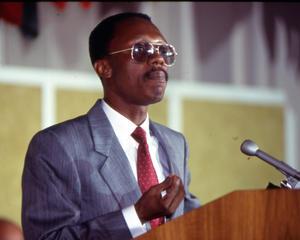
“Photo Credit – OAS”
The year 2012 began with a degree of promise and optimism that Jean Claude Duvalier would finally stand trial for his role in committing crimes against humanity and for embezzling hundreds of millions of dollars from Haiti’s treasury. Such a trial would be the most significant human rights proceeding in Haitian history. It has the potential to end a long era of impunity, improve the performance of Haiti’s judiciary, and deliver justice to the hundreds of thousands who were victims of the former “President-for-life.” Nearly four months later, the pursuit of Duvalier for human rights abuses has stalled and the media spotlight has shifted, notwithstanding piles of documentary evidence, direct testimony of victims, and forensic financial audits submitted to the Haitian courts.
Haiti has an obligation under numerous international treaties it has signed to try Duvalier for crimes against humanity. But in late January, Judge Carves Jean announced that Duvalier will only face trial for charges of embezzlement. According to the January 25 Miami Herald, “lawyers estimated that Haiti’s former dictator embezzled at least a half-billion dollars through an elaborate scheme of false companies, phony charities, and transfers in the name of friends and family.”
While this miscarriage of justice is currently occurring in Haiti, the United States is busy resuscitating its worn and failed case against another former Haitian President. On March 13, the Miami Herald ran an article titled “Miami Bribery Probe Zeroes in on Haiti’s Ex-Leader Aristide.” The emergence of this latest case is significant, as it is a key step in the revival of a long and failed history of attempting to frame Jean Bertrand Aristide. It also raises the question why the United States is all but silent on Duvalier, yet wastes hardly any time in bringing charges against Aristide?
The truth is that the United States has never stopped trying to go after Aristide, and on the other hand has never applied any pressure for Duvalier to face trial for his numerous abuses. This most recent attempt comes after a long series of failed attempts of bringing charges against Aristide in relation to human rights abuses, drug trafficking, and embezzlement.
For example, in November 2005, 21 months after the second coup d’état against Aristide, the illegal regime of Gérard Latortue presented a RICO (Racketeer Influenced and Corrupt Organizations Act) lawsuit in a U.S. court, accusing Aristide of corruption and the embezzlement of tens of millions of dollars. The case was later withdrawn, but it succeeded in damaging the reputation of Aristide.
Aristide’s former security chief, Oriel Jean, has also revealed to the weekly newspaper Haiti Liberté that during his brief detainment in Canada in mid 2004 for travelling to the country without a visa, “the U.S. government offered him many incentives to testify against Aristide, to say that Aristide was somehow involved in drug trafficking.”
Aristide’s present accuser is Patrick Joseph, the former director of TELECO, the former state telephone company. The Miami Herald reported that “According to the indictment, Official B and senior officials of Haiti Teleco, the telecommunications company owned by Haiti’s Central Bank, allegedly received payments totaling about $2.3 million from Miami businesses Cinergy Telecommunications and Uniplex Telecom Technologies.” 
“Photo Credit – Wall Street Journal”
In June 2003, Aristide fired Joseph from his position due to issues of corruption within TELECO. Last month Joseph negotiated a guilty plea with U.S. federal prosecutors for accepting $2.3 million in bribes from U.S. companies which fell under the Haitian anti-bribery laws and the statute of U.S. wire fraud. He currently faces a maximum sentence of 20 years. It has come as no surprise that he agreed to co-operate with the Department of Justice in order to receive a lesser sentence. Joseph’s plea deal can be accessed here.
According to Miami laywer David Weintsein, the current chief of narcotics in the U.S. Attorney’s Office, “There is no doubt that Official B is Aristide based on the language in the indictment.”
Aristide’s lawyer, Ira Kurzban, told the Herald, “In the end, there is not a shred of evidence in the indictment that Aristide did anything corrupt except uncorroborated testimony of a person who is an admitted corrupter and criminal.”
In addition to bringing another well U.S.-funded case against Aristide, such a movement shifts attention away from the important embezzlement case against Duvalier and accompanying calls for the charges of crimes against humanity to be reintroduced. It also reveals the dangerous double standard that the United States has in its relentless pursuit of Aristide, on the one hand, and its blatant disinterest in Duvalier, on the other.
In response to the new case against Aristide, Mark Weisbrot of the Center for Economic and Policy Research wrote on March 13 that “The U.S. government has spent millions and possibly tens of millions of dollars trying to railroad Haiti’s former president. On behalf of U.S. taxpayers, we could use a Congressional inquiry into this abuse of our tax dollars. It also erodes what we have left of an independent judiciary to have federal courts in Florida used as an instrument of foreign policy skullduggery.”
As previously stated, the trial of DuvaÂlier has the potential to be the most sigÂnifÂiÂcant human rights case in HaitÂian hisÂtory”but the total absence of U.S. and other international assistance to the Haitian judiciary in prosecuting a case is damning. The U.S. obsession to contain Aristide in exile, or incarcerate him in the United States on corruption charges speaks volumes about their unease with him physically being in Haiti. Even Aristide’s lack of involvement in politics constitutes a threat to the interests of the United States. He has since reopened his University of the Aristide Foundation”which was shut down after the 2004 coup”and will continue to train medical doctors at no cost. In comparison, Jean Claude Duvalier has left a long trail of Swiss bank accounts, Ferraris, Miami condos, and jewellery abroad, and is now routinely breaking his house arrest and dining in expensive restaurants in Pétionville, an upscale suburb of Port-au-Prince. It is because of such flagrant abuse of human rights and interference in internal Haitian affairs that Aristide remains a powerful symbol for the broader fight for social justice in Haiti, and thus remains a thorn in the side of the United States and others who wish to profit off of Haiti’s status quo.
Kevin Edmonds is a NACLA blogger focusing on the Caribbean. For more from his blog, “The Other Side of Paradise,” visitnacla.org/blog/other-side-paradise. Edmonds is a former NACLA research associate and a current PhD student at the University of Toronto, where he is studying the impact of neoliberalism on the St. Lucian banana trade.
*********************

Miami bribery probe zeroes in on Haiti’s ex-leader Aristide
BY JACQUELINE CHARLES AND JAY WEAVER
[email protected]

According to the indictment, Official B and senior officials of Haiti Teleco, the telecommunications company owned by Haiti’s Central Bank, allegedly received payments totaling about $2.3 million from Miami businesses Cinergy Telecommunications and Uniplex Telecom Technologies. The businesses are accused of using “shell” companies to kick back the money to those officials.
Aristide’s lawyer, Ira Kurzban, declined to comment about the Justice Department’s investigation because the ex-president hasn”t been charged with any crime. But, Kurzban said: “I view this as part of the same smear campaign that the United States has orchestrated against Aristide since he was first elected in 1990.”
The indictment alleges that the bribes were passed to Aristide via “Company A,” a reference to Digitek, a suspected front owned by Aristide’s brother-in-law, Lesly Lavelanet. He could not be reached for comment at his Coral Springs home.
Since an earlier related indictment was returned by a federal grand jury in 2009, a dozen South Florida business people and Haitian officials have been charged in the high-profile case, alleging the payment of kickbacks in exchange for discounted long-distance phone rates. Profits from those lower rates were pocketed by the Haitian officials — not the government’s phone company. So far, seven of those defendants have been convicted of corruption or money laundering, including Patrick Joseph, who pleaded guilty in February to accepting bribes. Joseph is cooperating with Justice Department lawyers and is a crucial witness in the investigation of Aristide, according to sources familiar with the case.
Joseph, who served as Aristide’s director general of Haiti Teleco in March 2001 to June 2003, has told U.S. authorities that he shared some of those kickbacks with the former president, the sources said. Joseph’s father, Venel Joseph, appointed by Aristide, was the governor of the Bank of Haiti, the central bank, during that period and is referenced in the indictment as “Official A.””
The Central Bank was used to distribute the kickbacks paid by the Miami businesses, the indictment says.
Patrick Joseph’s Miami attorneys, Guy Lewis and Richard Dansoh, declined to comment. Justice Department officials also would not comment.
At Joseph’s plea hearing last month, a prosecutor said “half” — or $1 million — of the alleged kickbacks were “intended” for “Official B, an official in the executive branch of the Haitian government.”
“In exchange for these bribes, Official B and Joseph provided Uniplex and Cinergy with various business advantages, including an exclusive agreement to market certain calling cards at a favorable rate,” Justice Department lawyer James Koukios said in court.
“In addition, Joseph was aware of and agreed that additional bribe payments to Official B would be laundered through Company A,” Koukios said, without mentioning Digitek by name.
The revelation that federal officials are still pursuing Aristide, years after a U.S. grand jury investigation failed to nab him on drug-trafficking and money-laundering allegations, comes at a politically charged time in Haiti.
Haitian media reported last week that President Michel Martelly’s government had indicted Aristide for corruption and drug trafficking during his rule, immediately triggering anger among his supporters. Haiti’s justice minister told The Miami Herald the reports were false.
Still, thousands marched through the streets of Haiti’s capital Wednesday, singing pro-Aristide slogans while bashing Martelly, to mark the eighth anniversary of Aristide’s ouster from power on Feb. 29, 2004. The demonstration — the biggest anti-Martelly protest since he came to power in May — showed that Aristide still enjoys a measure of popularity. He returned to Haiti from South Africa last March over the strong objections of the Obama administration.
Before it was privatized last year at the behest of the U.S. government, Haiti Teleco was a corruption-plagued, money-losing company that fueled the bank accounts of its executives. Fewer than 2 percent of Haitians had service from its landline monopoly, but it had a lucrative long-distance business. After the January 2010 earthquake, the company finally got a lifeline when a firm named Viettel, run by Vietnam’s military, bought a major stake in the entity, reducing Haiti’s shares to 40 percent.
The controversy over Haiti Teleco’s corrupt past will play out again Monday, when a former senior executive, Jean René Duperval, faces trial on money-laundering charges in Miami federal court as part of the initial indictment. He is accused of receiving bribes from the same Miami businesses.
The trial of Duperval, Haiti Teleco’s former director of international relations, highlights the Justice Department’s persistence in pursuing the bribery case and Aristide.
Some question the zeal. But Alex Dupuy, a sociology professor at Wesleyan University who has written about the two-time ex-president, said “if they have solid evidence of his involvement in bribery or other criminal activities, they should indict him and bring him to justice.”
The U.S. government may be sending a signal to Aristide, called Titid by his admirers, to think twice about trying to re-enter the political scene, observers said.
“The display of popular support for Aristide is very worrisome to the U.S., so indicting Titid before a potential comeback makes perfect sense,” said Robert Fatton, a Haiti expert at the University of Virginia.
Still, unless the Justice Department has an air-tight case, arresting Aristide could have volatile consequences, observers said.
Corruption and drug-trafficking charges have long dogged Aristide.
Haiti’s interim government produced four blistering reports from two government investigative commissions, alleging he had embezzled more than $20 million of his country’s meager public funds.
But the Haitian government’s financial watchdog agency could not prove the allegations. Also, a civil lawsuit filed in Miami by the interim government, gained no traction.
Meanwhile, federal prosecutors investigated Aristide for allegedly accepting bribes from drug traffickers. But they could not make their case because of a lack of financial documents to back up convicted cocaine kingpin Jacques Ketant’s accusations, according to sources familiar with that probe.
Now, the mere mention of Aristide as Official B in the Foreign Corrupt Practices Act indictment filed by the Justice Department in January marks the first time he has been implicated in the U.S. bribery investigation into Haiti’s state-owned telecommunications company.
From 2001 to 2004, “Official B was an official in the executive branch of the Haitian government,” says the indictment, describing the exact period of Aristide’s second term as president.”I am led to believe that Official B is the former president of Haiti, Aristide,” said veteran Miami criminal defense attorney Joel Hirschhorn, who represents Cinergy and two of its executives in the case.
“There is no doubt that Official B is Aristide based on the language in the indictment,” said Miami lawyer David Weinstein, who was the chief of narcotics in the U.S. Attorney’s Office during the past decade. He and other prosecutors won convictions against several Haitian government and police officials for accepting payoffs from drug traffickers, who used the country to ship cocaine to the United States.
But Weinstein cautioned that the Justice Department will face daunting challenges in making a money-laundering case against Aristide, even if the cooperating witness, Joseph, points investigators in the right direction.
There is a looming deadline in the probe because of the statute of limitations. Also crucial: Internal Revenue Service agents must find bank or financial records to show that Aristide received payments, if he did.
“Without someone producing a picture of him taking the money or agents uncovering a bank account directly linking him to payments, they are going to have a hard time building a case to win a conviction,” Weinstein said.
Last week, Hirschhorn succeeded in getting Cinergy dismissed as a defendant before Monday’s trial.
“My clients” dealings with Haiti Teleco were perfectly legitimate,” said Hirschhorn, who added that Cinergy’s top executives, now fugitives in Brazil, only met Aristide once for a brief moment. “They helped Haiti Teleco get through some very difficult and trying times.”
The Looting of Haiti Teleco
A federal bribery case in Miami may shed light on how a well-connected U.S. firm operated during the Aristide years.
The slaying of a former director of the Haitian Central Bank in Port-au-Prince last week might at first seem like a random event in a violent country. But the shooting of Venel Joseph at the wheel of his car looks more like a hit job. It comes just days after the Miami Herald reported that Joseph’s son, Patrick Joseph, is a key witness in a federal bribery case in Miami involving alleged kickbacks paid by American telecom companies to Haitian officials. The younger Joseph, according to Herald sources, has fingered former Haitian President Jean Bertrand Aristide as one of those officials.
The indictment doesn’t name Mr. Aristide. But the Herald reported that lawyers familiar with the case said that an unnamed individual in the document””Official B””is “indeed the ex-president.” The Justice Department alleged in court that “Official B” and Patrick Joseph, who is a former director general of the government telecom monopoly Haiti Teleco, received kickbacks from U.S. companies in exchange for favorable pricing when terminating calls in Haiti. Mr. Joseph has pleaded guilty to taking bribes and is cooperating with Justice, according to the Herald article.
It is a case that ought to interest Americans, and not only because it means Mr. Aristide”who was, according to a detailed lawsuit filed by Haiti in civil court in South Florida in 2005, a notoriously corrupt strongman”might be brought to justice. That would be a step toward ending impunity in Haiti, which in turn would be good for political stability and for U.S. security interests in the hemisphere. Mr. Aristide’s American lawyer, Ira Kurzban, told the Herald that there is “not one shred of evidence” against his client in the indictment.
But for Americans there may be another even more important reason to pay attention: It is possible that by getting to the bottom of how Haiti Teleco operated during the Aristide years, investigators will finally uncover the details of the arrangement that Fusion Telecommunications”run by former Democratic Party Finance Chairman Marvin Rosen with Joseph P. Kennedy II and numerous influential Democrats on the board”had in Haiti during the Clinton years. That would be edifying, given how Bill Clinton inexplicably tolerated Mr. Aristide’s despotism even after the U.S. had restored him to power in 1994.
Back in those days, Haitians working for Teleco whispered to me of an alleged kickback scheme. Teleco was one of the few sources of hard currency for the country and they charged that the deal between Fusion and Mr. Aristide meant that the company was being looted. They claimed that Fusion had an office inside Teleco, was getting access to the Teleco network at a big discount, and was paying Mr. Aristide in return.
But there was no transparency at Teleco, and these brave patriots were afraid to go public with what they knew. It was only after Mr. Aristide was pushed from power by a popular revolt in February 2004 that the interim government could confirm that the company had been cleaned out.
In the fall of 2004 I was approached by Michael Jewett, a former telecom executive at New Jersey-based IDT. He alleged that he had been fired from the company for objecting to a bribery scheme similar to the one that had been described to me by Haitians regarding Fusion. He had filed a wrongful dismissal case that alleged that he was told to put payments in an offshore account for the benefit of Mr. Aristide. Federal Communications Commission records proved that Teleco had indeed given IDT a 66% discount to the official rate, but Mr. Jewett was never able to prove that Mr. Aristide was the beneficiary of the offshore account. IDT denied wrongdoing and eventually settled with him out of court.
That case prompted me to ask the FCC for copies of Fusion’s contracts. I was told that the file had disappeared from its record room. When the FCC asked carriers to send duplicates, Fusion said hurricanes had destroyed many of its records, and it produced only one document. Then it went to court to block me from seeing it. I used the Freedom of Information Act to prevail and learned that in 1999 Teleco had given Fusion a rate of 12 cents per minute when the official rate was 50 cents.
Joseph P. Kennedy II wrote in a letter published by the Journal that he was “not aware” of any wrongdoing on the part of Fusion. The company has long maintained its innocence, and it has not been charged. But the Justice Department now alleges in its indictment that other companies that received discounts paid kickbacks to get them.
Patrick Joseph could be the best hope that Haitians have of getting to the truth about Mr. Aristide and his American business partners. But sources say the former Teleco executive still has relatives in Haiti. If he fears for them, he could clam up. That would be one explanation for his father’s murder.
Write to O’[email protected]
Add a comment:
Powered by Facebook Comments




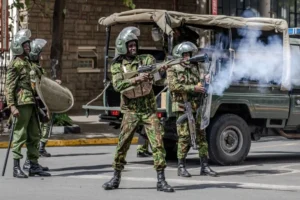
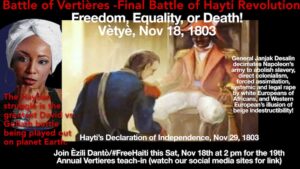
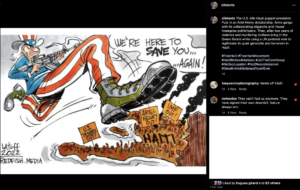
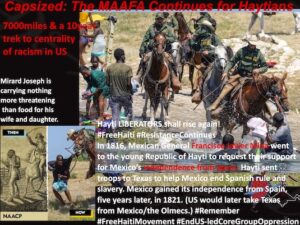


No Pings Yet